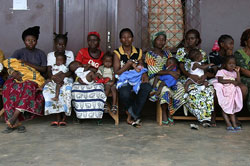A look at the evolving business model for (mobile governance) m-governance projects and the use of mobile technology as a catalyst for inclusive development.
The mobile phone has ushered in an era where a phone is no longer a plain communication device but an empowering piece of technology that can make a difference to the lives of people worldwide. Mobile Governance initiatives and the provisioning of life-impacting services are vital to today's developing countries as they seek to enrich the lives of communities by providing preventive and curative care to advice on managing crops and lots more. By using mobile services as an established system for two-way communication to deliver information to citizens, governments can provide individuals with remote services, potentially making an impact on mortality rates and education, whilst empowering 'participative governance'.
Why collaboration is the key to success
As well as initial government backing, expertise and voluntary participation and support of various stakeholders in the eco-system are essential. It is imperative to recognise the importance of the private sector, social sector organisation or foundations/trusts, donor agencies, domain experts, technology providers and the mobile service providers or telecom operators. With each of these different bodies comes knowledge and experience that can enhance the overall perspective, scale and reach of the projects.
Back to basics
The telecom markets across the developing world are continuing to breed an exciting mobile services and applications industry. Yet recent statistics show between 70 and 80% do not have access to smartphones or mobile apps, and less than 10% have access to effective data dependent services.

The initiative provides an audio-based mobile training course targeting front line health workers (FLW) to help them deliver life-saving information, and is also aimed at helping pregnant women and their families prepare for the unexpected and potentially deadly situations that can arise in child birth.
This is where mobile service providers and technology providers play a pivotal role as they come up with ideas and platforms extending their core network capabilities and application platforms to power services for those who don't have smartphones, but still allowing access to information. By converting intelligence into simple tools, the people who need assistance will be able to access it in a format that is open to them, primarily voice and in some cases messaging channels like SMS, USSD.
How a collaborative m-governance initiative can work
Alongside the Bill and Melinda Gates Foundation, BBC Media Action and the government, we worked on the Bihar initiative, Project Ananya. Situated in Northern India, Bihar was known for its high mortality rates in women and children. The aim of the project was to use mobile phones to provide cost-effective training and job-aids to community health-care workers.
In collaboration with BBC Media Action and the initiative's partners, we provided the technology and platform to enable community health workers to expand their knowledge of life-saving maternal and child health behaviours. Apart from providing an audio-based mobile training course targeting front line health workers (FLW) to help them deliver life-saving information, it also aimed to help pregnant women and their families prepare for the unexpected and potentially deadly situations that can arise in child birth.
Driving mobile innovation
The time is now for the developing nations to take a giant leap forward from e-governance to m-governance and life changing mobile services. There is a need to develop and enable eco-systems that empower the industry to develop effective applications and services that aid in overall socio-economic development. While there are bound to be challenges, we need to solve them head on. It is important for all the stakeholders to come together in making positive headway towards healthier socio economic development.














